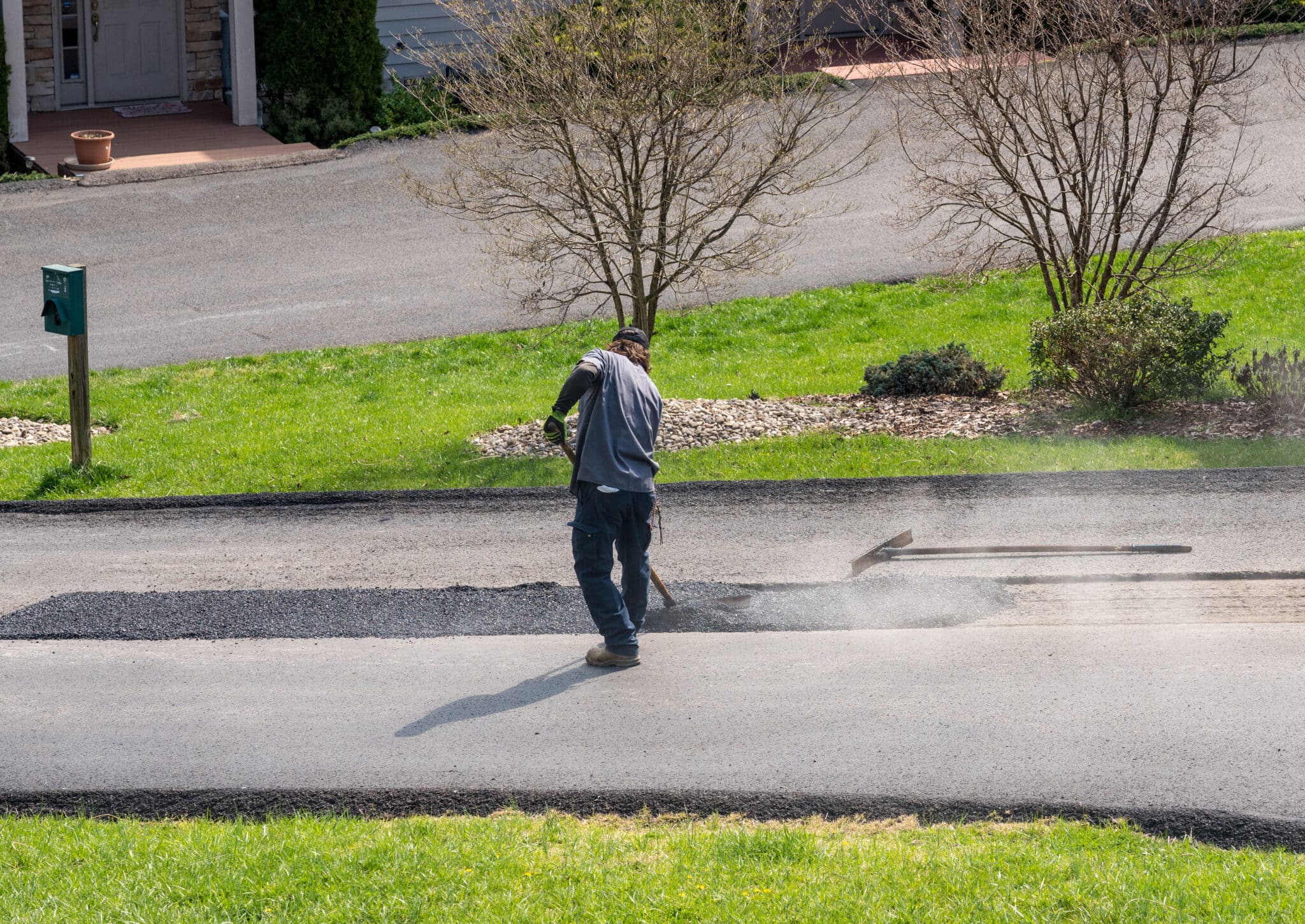Homeowners are often left debating between going with an asphalt or concrete driveway. Both materials have advantages and disadvantages, making it a tough decision to make. In this guide, we will discuss the key differences between asphalt and concrete driveways to help you make an informed decision.
The Main Differences Between Asphalt and Concrete Driveways
The biggest difference between asphalt and concrete driveways comes down to their composition, what they’re made of, and their overall appearance. Each material has unique characteristics that affect how it looks, how it performs, and how much maintenance it will require over time. Understanding these differences, along with the pros and cons of each, can make it much easier to choose the best driveway material for your home, your budget, and your long-term needs.
Asphalt Driveways
Asphalt driveways are created from a mixture of aggregate materials, such as crushed stone, gravel, and sand, combined with bitumen, which is a type of petroleum. This combination creates a smooth, black surface that is known for its flexibility and quick installation. Asphalt driveways are typically laid over a gravel base and compacted to form a solid foundation. These driveways typically last 15-20 years, depending on climate, usage, and maintenance practices.
Concrete Driveways
Concrete driveways also contain aggregates like sand and gravel, however they are mostly composed of a mixture of cement and water. The mixture is poured into molds and then allowed to cure over a while, around 7 to 14 days. It’s important to note that this number can vary depending on weather conditions. Concrete driveways appear light gray, but they can be customized to achieve different aesthetic effects. They generally last for 30 years or more with proper maintenance.
Advantages of Asphalt and Concrete Driveways
Let’s take a closer look at the advantages of each type of driveway.
Advantages of Asphalt Driveways:
- Cost-Effective: The installation of asphalt driveways is generally less pricey compared to concrete. The low upfront cost makes it a budget-friendly option for many homeowners.
- Faster Installation: Asphalt driveways can be installed relatively quickly, often within a day or two. This is due to the rapid setting nature of asphalt, which results in a much shorter curing time before the driveway can be used.
- Flexibility: Asphalt is more flexible than concrete, and it can expand and contract with temperature changes. Its flexible nature prevents the likelihood of cracks from forming, which can help homeowners save money on repair costs.
- Protection: Routine sealcoating and maintenance help protect the asphalt surface from moisture and UV damage. This added layer of protection reduces the chances of severe damage and extends the driveway’s lifespan.
Advantages of Concrete Driveways:
- Durability: Concrete driveways are known for their durability and longevity. Following proper installation and maintenance, a concrete driveway can last 30 years or more. Concrete is also resistant to heavy loads and is less likely to develop deep ruts or indentations.
- Low Maintenance: Concrete driveways demand less frequent maintenance compared to asphalt. Once cured, concrete surfaces do not need to be sealed regularly. This can save homeowners time and money in the long run.
- Aesthetic Flexibility: As we mentioned earlier, concrete offers a wide range of design options. Concrete customization comes in the form of coloring, stamping, and staining. Homeowners can choose from various textures and patterns to complement their home’s style and their personal preferences.
- Reflectivity: Concrete driveways have a high reflectivity, which helps to keep surface temperatures lower. This can be especially beneficial in hot climates.
Disadvantages of Asphalt and Concrete Driveways
While both materials offer unique benefits, they also come with some drawbacks that should be taken into account.
Disadvantages of Asphalt Driveways:
- Frequent Maintenance: One of the major drawbacks of asphalt driveways is the requirement of regular maintenance to keep them in good condition. The resealing process, done every 2-3 years to protect the surface from damage, can be tedious. A great option is partnering with an asphalt maintenance company who can take care of your maintenance and make sure your pavement is always looking fresh.
- Durability Issues: Although asphalt is flexible, it can still be susceptible to damage from extreme temperatures, oil spills, and heavy loads. In colder climates, the freeze-thaw cycle can lead to surface cracks and deterioration. Some of these damages can be fixed with the right tools, while others may require the help of a professional.
- Appearance: Asphalt driveways are typically black upon installation and can turn gray over time. The dullness of asphalt greatly limits aesthetic options. While asphalt can be resurfaced, it does not offer the same level of customization as concrete.
Disadvantages of Concrete Driveways:
- Higher Installation Costs: Concrete driveways are usually more expensive to install than asphalt. This higher initial investment can be a dealbreaker for some homeowners.
- Cracking: Concrete driveways are prone to cracking, especially if not installed correctly or if the subbase is not adequately prepared. Cracks can develop due to temperature changes, heavy loads, or soil movement.
- Repair Complexity: Repairs to concrete driveways can be more complex and noticeable compared to asphalt. Filling cracks or patching damaged areas often requires professional assistance to ensure a seamless repair.
When choosing between an asphalt or concrete driveway, it’s important to consider these factors and the pros and cons.
Cost Comparison Between Asphalt and Concrete Driveways
Cost is probably the largest factor when choosing between asphalt and concrete driveways. Here’s a detailed comparison of installation and maintenance costs:
- Installation Costs: Asphalt driveways generally cost between $3 and $5 per square foot, making them more affordable upfront. Concrete driveways, on the other hand, range from $6 to $12 per square foot, depending on the finish and design chosen. This higher cost is mainly due to the complexity of installation and the materials used.
- Maintenance Costs: Asphalt driveways require resealing every 2-3 years, with costs typically ranging from $0.06 to $0.45 per square foot for materials and about $1.10 per square foot for labor. Concrete driveways may need occasional sealing or cleaning. The average cost of sealing concrete hovers around $0.20 to $0.60 per square foot for only the materials and around $2 to $3 per square foot for the labor. Although it is more expensive to seal concrete driveways, they demand the procedure much less frequently compared to asphalt.
Which is Better for Your Driveway?
Here is a quick overview of which drive is more suitable for you:
- Asphalt: If you are looking for a cost-effective solution with a quick installation process, asphalt may be the better choice. It is also a good option if you live in an area with extreme temperature fluctuations, as its flexibility helps mitigate the risk of cracking.
- Concrete: If you are willing to invest more upfront for a long-lasting and low-maintenance driveway, concrete might be the better option. Concrete offers more design options and stronger durability, making it suitable for homeowners who prioritize aesthetics and longevity.
No matter the material you choose, both asphalt and concrete driveways require proper care and maintenance to ensure their longevity. Taking care of your pavement can extend its life and increase the curb appeal of your property.
Let Superior Asphalt Help You Maintain Your Asphalt Driveway
The decision between an asphalt and concrete driveway boils down to your individual needs, preferences, and budget. Whether you opt for the flexibility of asphalt or the robustness of concrete, both materials can enhance the curb appeal of your home and provide a reliable surface for years to come. If you have any questions about asphalt driveways, feel free to reach out to us. At Superior Asphalt, we take pride in providing top-notch materials and asphalt maintenance services. Contact us to learn more!


